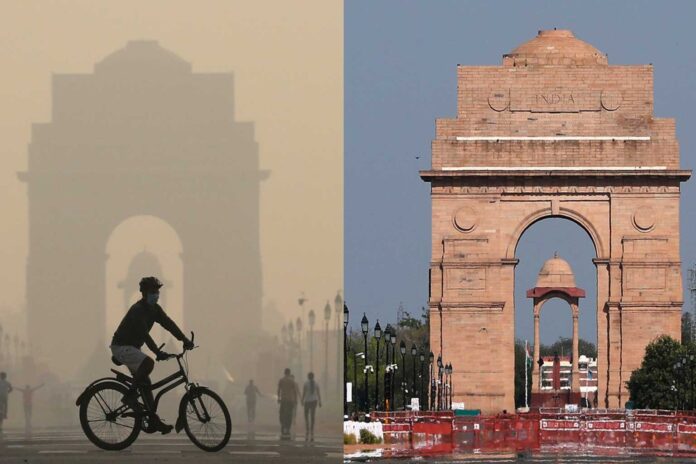If Delhi’s air met the World Health Organisation’s (WHO) pollution standards, residents could live up to 7.8 years longer, according to a new report by the Energy Policy Institute at the University of Chicago (EPIC). Despite a notable 19% drop in India’s overall particulate pollution in 2022, with PM2.5 levels falling from 51.3 µg/m³ in 2021 to 41.4 µg/m³ in 2022, the report reveals that all 1.4 billion Indians still breathe air that’s far from safe.
Delhi, one of the world’s most polluted cities, stands to gain the most from cleaner air. The report highlights that if the city’s air quality met the WHO guideline of 5 µg/m³, the average Delhiite could gain nearly eight years of life expectancy. In contrast, North 24 Parganas, India’s second most populous district, could see life expectancy increase by 3.6 years under similar conditions.
While India’s average life expectancy has increased by one year due to the reduction in pollution, the report paints a stark picture of the ongoing health crisis. On average, particulate pollution cuts 3.6 years off the life of every Indian. This is more than double the impact of child and maternal malnutrition, which reduces life expectancy by 1.6 years, and more than twice the toll of tobacco use, which cuts 1.5 years.
The Northern Plains, home to 540.7 million people, remains the most affected region, with residents facing the possibility of losing 5.4 years of life expectancy if pollution levels persist. Even as the rest of the country sees improvements, this region continues to grapple with severe air quality issues.
The report also highlights success stories from 2022, with districts like Purulia and Bankura in West Bengal, and Dhanbad in Jharkhand, recording substantial drops in pollution levels—over 20 µg/m³ in each case. Sustained efforts in these regions could add 2 to 2.3 years to the life expectancy of residents.
Globally, the EPIC report underscores that air pollution remains the greatest external threat to human health, rivaling the dangers of smoking. The data shows a troubling disparity: people living in the most polluted areas lose 2.7 years more of life expectancy than those in cleaner regions.
The report calls for stronger national pollution standards and more rigorous enforcement to combat the life-shortening effects of air pollution. As Delhi and other highly polluted regions continue to battle for cleaner air, the potential gains in health and longevity underscore the urgent need for sustained action.










